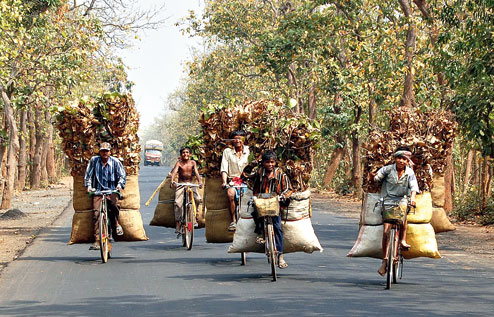 |
The Narendra Modi government may be concerned about “clean” India but does it have a somewhat blinkered view when it comes to green India? That’s what many environment experts are saying after the government proposed a series of changes to the Scheduled Tribes and Other Traditional Forest Dwellers (Recognition of Forest Rights) Act, 2006, or FRA. The move has sparked a storm of outrage from activists who allege that it will deprive tribals and forest dwellers of their democratic rights to their own land.
One of the proposals is to do away with a provision in the act that requires the “prior informed consent” of gram sabhas before their forests are cleared for industrial activities. A recent circular issued by the ministry of environment, forests and climate change (MoEFCC) states that linear projects such as roads, canals, pipelines, optical fibres or power transmission lines are exempted from seeking the consent of gram sabhas. Now district collectors will have the power to certify that the diversion of land is permissible for a development project.
This is a dilution of the act, say activists. And recently, thousands of adivasis demonstrated in Gajapati in Odisha, against the proposal to make changes in the Forest Rights Act.
It’s not just activists who are crying foul. Legal experts too say that such a change is tantamount to depriving tribals and forest dwellers of their legal rights and that this can be challenged in court. “The powers are given to the gram sabha under Section 6 of the FRA to determine the nature and extent of individual and community forest rights. Therefore, the role of gram sabhas is very significant,” says Supreme Court advocate Sanjay Parikh, who fought for the rights of the Dongria Kondh in Niyamgari against Vedanta Resources.
He adds, “The proposed amendment will dilute the role played by the gram sabhas in doing justice to the scheduled tribes and other forest dwellers. In fact, the elimination of gram sabhas in the process will be a complete nullification of the act.” Adds forest rights activist Debjeet Sarangi, “Doing away with this provision would mean giving speedy clearances for projects, which is the ultimate aim of the government.”
However, that is exactly what voices from industry are happy about. Says Rita Roy Choudhury, senior director, Federation of Indian Chambers of Commerce and Industry, “These steps have been taken to expedite the process of clearance of development projects. The government is keen on doing reforms and is trying to do away with unnecessary bottlenecks and delays that come up in projects.”
While many point to the scores of projects that were stuck during the tenure of the previous government owing to environmental clearances not coming through, others say the NDA government’s move is a blatant violation of the existing law. In a letter dated October 28, 2014, the MoEFCC declared that for plantations, notified as forests for 75 years after the FRA came into force on December 13, 2005 — and not having tribal population as per the 2001 and 2011 census — “no forest rights are likely to be recognised, even if the process is stipulated in the Scheduled Tribes and Other Traditional Forest Dwellers (Recognition of Forest Rights) Act, 2006.”
Neema Pathak Broome, member of the Pune-based NGO, Kalpavriksh Environment Action Group, points out that according to Clause 2(d) of the FRA, “forest land” means land of any description falling within any forest area and includes unclassified forests, undemarcated forests, existing or deemed forests, protected forests, reserved forests, sanctuaries and national parks. “The definition of forest land makes no distinction between plantations and other forests and includes non-notified unclassified as well as ‘deemed’ forests. It also includes all forests conforming to the ‘dictionary definition of forest’ as per the Supreme Court judgment of 1996 in the Godavarman case, irrespective of whether these are recorded or notified as forests or not,” she says. “The MoEFCC’s order violates the principal act, which is meant to undo the historical injustice suffered by forest dwelling tribal and non tribal communities,” she adds.
Activists have also slammed another provision in the circular — that the FRA does not apply to forest dwellers who have not been living on that land for more than 75 years before the law was instituted.
Experts say that this latest directive is contradictory to a letter by the ministry of tribal affairs sent to the MoEFCC earlier. The letter had said, “There is no requirement in the act that for the purposes of recognition and vesting of forest rights, a person or community of other traditional forest dwellers must have been specifically located in a particular and identifiable location in the forest for 75 years. As long as they are able to establish that they have been primarily residing in and dependent on forests or forest land for bona fide livelihood needs for 75 years prior to December 13, 2005, they are to be considered eligible for recognition and vesting of forest rights under the act.”
A group of over 300 social environmental and tribal activists and organisations have sent a letter to Prime Minister Narendra Modi registering their protest against the proposed changes.
The ministry of tribal affairs too wrote a stern letter to the MoEFCC, saying that no agency of the government has the power to exempt the application of the act in part or in full. And any action inconsistent with the act would not be legally tenable and is likely to be struck down by the court. “We will ensure that rights of tribals and forest dwellers under the act are duly protected,” tribal affairs minister Jual Oram says.
The MoEFCC, on its part, says it is not riding roughshod over the act. “We are not doing anything arbitrarily. We are consulting the people concerned to see how developmental projects could be expedited,” says an official in the ministry who declined to be quoted.
Advocate Parikh says that any changes to the law would mean that the government is going back on its commitment to abide by international declarations on environment protection. “All these laws were formed keeping India’s commitment to international declarations in mind. Plus, there are several Supreme Court judgments that reinforce the commitment that India has made on sustainable development. It is legally not permissible to tinker with the environmental jurisprudence of the country,” Parikh stresses.
Clearly there are two sides to the debate, and it remains to be seen if the government is able to reconcile the concerns of all stakeholders — not just the tribals and forest dwellers but also those who want to push through development projects in quicktime.











